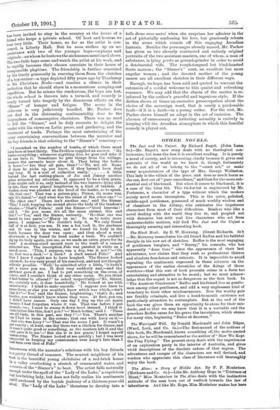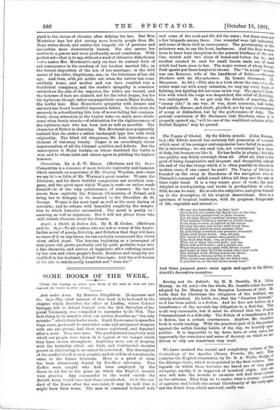The Alien: a Story of Middle Age. By F. F.
Montresor. (Methuen and Co. 6s.)—Like Mr. Anthony Hope in "Tristram of Blent," Miss Montresor in The Alien deals with the instinctive attitude of the man born out of wedlock towards the law of inheritanfie. And like Hr. Hope, Miss Montresor makes her hero
yield to the claims of chivalry after defying the law. But Miss Montresor lays her plot among more homely people than Mr. Hope writes about, and creates her tragedy out of passions and necessities more elementarily human. She also carries her motive to a graver and more profoundly moral conclusion. With perfect art—that is to say, without a word of obtrusive didacticism —she makes Mrs. Mordaunt's early sin bear its natural fruit of sad consequence in the mockery of her loveless married life ; in the vicious disposition of the son of her marriage; in the wild career of her elder, illegitimate, son ; in the bitterness of her old age. And then, with yet nobler art, when the outlaw has come suddenly home, and mother and son have tumbled into a fraudulent conspiracy, and the reader's sympathy is somehow enlisted on the side of the impostor, the tables are turned, and the honours of hero are claimed, not for the rebel Jasper, but for his righteous though rather unsympathetic cousin Major Iredale, the lawful heir. Miss Montresor's sympathy with sinners and outcasts has found beautiful expression before. In this story she succeeds in subordinating this vein of never-failing but compara- tively cheap attraction to the higher note—so much more whole- some when firmly struck—of admiration for the righteousness of the righteous man who has been just as well as merciful The character of Esther is charming. Mrs. Mordaunt is so poignantly realised that she makes a rather hackneyed type live with vivid originality. The blind old clergyman, Mr. Joel, introduces an element of visionary beauty. Jasper is an exceedingly clever impersonation of all the Ishmael qualities and defects. Brit the masterpiece is Major Iredale, on whose deathbed the battle is won, and to whom saint and sinner agree in yielding the highest honours.















































 Previous page
Previous page